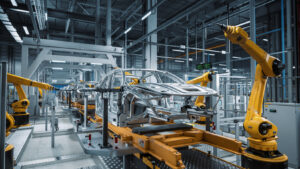
The fastening systems business for the automotive industry has undergone significant transformations in recent years, mainly due to various trends that have profoundly impacted mobility. These transformations are driven by a series of factors, including the evolution of vehicle technologies, increasingly strict government regulations, consumer demands, and innovation in materials and manufacturing.
Design, performance, and safety drive the evolution of the automotive industry.
The constant development of automotive design, the influence of new technologies in car production, and buyers’ demands for improved vehicle performance, safety, and fuel efficiency are leading to the need to find increasingly innovative and reliable fastening systems.
In the automotive industry, safety, efficiency, and performance are fundamental elements, to which fastening systems that hold together the crucial parts of the car also contribute.
Challenges for fastening system manufacturers.
First and foremost, fastening systems must ensure the structural integrity of the car. Then, the constant evolution of the industry has led to the introduction of innovative materials and production methods that increase component strength and reduce weight, promoting fuel efficiency, emissions reduction, and overall improvement in car performance.
In general, this has led to a growing demand for lightweight, durable, and compliant fastening systems. Consequently, there has been an increased demand in the automotive industry for systems produced in materials such as titanium and aluminum alloys.
New lightweight, durable materials.
These materials have double benefits: they not only reduce the overall weight of a vehicle but also improve its structural strength in line with what manufacturers are seeking today.
The electric mobility revolution is just beginning.
Furthermore, trends in automotive fastening systems have also been influenced by international efforts to promote electric and hybrid cars. With the spread of these new technologies, manufacturers are beginning to rethink traditional assembly methods to meet the specificities of electric vehicles. Fastening systems used in electric vehicles are increasingly customized, reflecting a shift from past standard solutions.
Industry 4.0 and SMART technologies.
The emergence of Industry 4.0 and the increasing adoption of SMART technologies in cars have added an entirely new dimension to the automotive fastening systems market. With the integration of sensors and connectivity, smart fastening systems are now emerging as a significant trend. This trend towards smart fastening systems offers a range of advantages, including increased safety, efficiency, and ease of use.
In conclusion, it is clear that the market for automotive fastening systems is undergoing a time of profound transformation, full of new opportunities and challenges for manufacturers.




